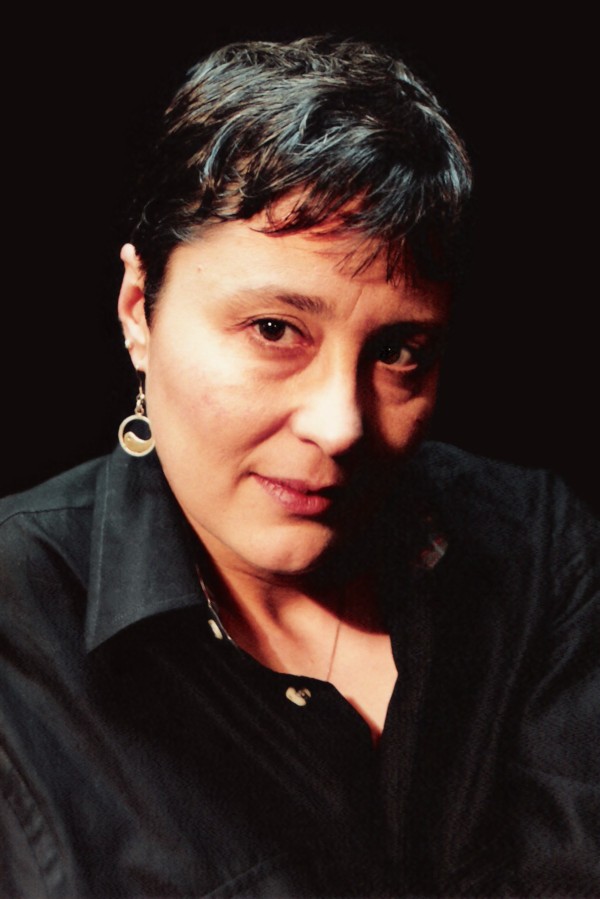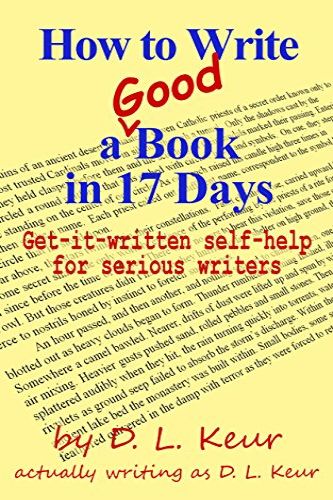Help Notes for Authors
 I'm not just an artist and a musician, I'm also an author of well over twenty books, fiction and non-fiction, both trad published and self-published. While I'm no self-declared expert, I will share with you some things I think are important to consider, especially when self-publishing like many of you are. (If you want to know more about me, you can click on my picture which will take you to my personal website, DLKeur.com.)
I'm not just an artist and a musician, I'm also an author of well over twenty books, fiction and non-fiction, both trad published and self-published. While I'm no self-declared expert, I will share with you some things I think are important to consider, especially when self-publishing like many of you are. (If you want to know more about me, you can click on my picture which will take you to my personal website, DLKeur.com.)
For authors, writing the book is the fun part. Honestly. For self-publishing authors, everything else is going to prove tedious, mind-numbing, difficult, and maybe seem impossible, not so much the editing and proofing, which can indeed be tedious and mind-numbing, but the task I'm actually talking about is figuring out how to successfully sell your book, then doing it. To do that, your first and foremost job is to figure out who your readers are — yes, even before you write the book.
If you plan on writing in a popular fiction genre, like erotica, romance, mystery, thriller and suspense, science fiction, fantasy, or paranormal, figuring out your readership is pretty easy (though narrowing that market demographic down so you stand a chance of success is much more difficult). If you're planning on writing non-fiction, the job is a little harder, but not much. But if you're writing works that are unique, finding your readership is going to be difficult to arduous. Here's the rule: If the fiction genre or non-fiction topic is popular, marketing competition will be very stiff, but the pool of potential readers is huge; if the fiction genre or non-fiction topic isn't popular, marketing competition is low, but the pool of potential readers is also small.
Starting out, your best success will be to ferret out a niche within your chosen genre that has a few well-known authors and a solid, dedicated, if small to midling readership. Those niches aren't as populated with other authors vying for exposure, plus there's a bleed-over from other niches in that popular main genre. For example science fiction is a highly popular fiction genre, but, when narrowed down to hard science fiction (science fiction founded in scientific accuracy and rational logic) as opposed to the more popular subgenres of military, adventure, or post-apocalyptic science fiction, the competition decreases ...because not as many authors write hard science fiction. Not only is the pool of authors you compete with smaller, so is the audience, but hard science fiction readers are dedicated fans. Since the competition isn't as overwhelming as more popular sci-fi subgenres, you stand a better chance of success when you are just starting out.
In non-fiction, targeting readership is easy if your book is focused at a very specific, narrow, or specialized topic. If it's more general, though, then, just like in fiction, you stand to face a long, uphill battle to gain ground.
Regardless of your genre, here are a few things to consider:
- The cover of your book is your first key reader enticement. It has to catch your target demographic readers' attention. And what genre or sub-genre you write is going to play a huge role in its design. It has to be unique, but it also can't stray outside the boundaries of genre reader expectations. That said, there's something to going 'out-on-a-limb' sometimes. This is especially true in less popular genres and niches.
- Next is the 'pitch' — a very short, catchy phrase or sentence that sums up the story without giving too much away, but entices the reader to explore further. Perfect ones are irresistible.
- There's the 'blurb' or 'description', one to a few short paragraphs that further entice and excite the potential reader.
You will potentially use numbers 2 and 3 on your book cover, number 2 perhaps on the front cover, but both on your back cover copy, and, if creating a hard cover book, on the back and a variation on the front inside jacket flap.
Budget
You need a budget. You need enough of a budget — money you can spend without fear of losing it, money you won't have to depend on for survival or emergencies — to get the help you need IF you need it, though I'm a true believer in doing it yourself if you can. If you can't or don't want to do it yourself, you'll need either well-educated, learned friends (read: experts) willing to do it for free or you'll need to shell out money for book editing, proofing, cover creation, manuscript formatting, and advertising. And it ain't cheap. In fact, it's downright expensive and full of risk. Pencil out what you can afford, do what you can yourself or with the help of learned friends, and, remember, advertising will cost you money, no way around it.
SOME GOOD, AFFORDABLE SERVICES:
EDITING AND PROOFING: Wordsmith Proofreading is a good choice. If you prefer Facebook, you can find Kim Huther's business page here.
MANUSCRIPT FORMATTING, eBook and Print: You definitely want Ray Hoy! Find him here at Misty Mountain Productions.
Book Marketing
This is a topic fraught with conflicting information, a great deal of hype, and laden with scam artists out to buy their next luxury car and dream house on your dollar. Beware.
Unless you're already famous or infamous, to launch a successful career as a writer, you have to have a book written, edited and proofed, properly 'dressed', and formatted if it's going to stand even a small chance of making it. After that, specifically:
- To launch as a non-fiction writer, you need 'cred' — reputation, credentials, and/or notoriety, or else your book has to be hugely practical, speaking to an audience's needs.
- To launch as a self-published fiction writer you need an existing fan base for your work (wattpad or similar venues), successful authors in the same genre willing to promote you, and/or a strong series launched all at once, preferably two of these, or, best, all three.
Then you need reviews (very hard to get). Statistically, only 1 in 1000 readers of your book will post a review unless incentivised to do so, and, though it's done and some authors do get away with it, incentivising readers for reviews will get you kicked off of the largest book selling sites like Amazon. Don't do it, even though you know that others do it and get away with it with impunity. You aren't them, and they've got an inside advantage you don't.
Once you have those things mentioned in the above paragraph, or, if determined, even if you don't, you need to advertise (Google Ads, Facebook, Instagram, BookBub, Book Gorilla, Amazon Advertising, email list, genre magazines, genre ezines, popular blogs and websites...).
 My foremost advice would be to keep writing more books in the same genre. The more books you publish in a genre, the more people will take you seriously as an author in that genre, and that's true whether you're traditionally published or self-published. If readers like your work, they'll want to buy and read more books by you ...which brings us to the issue of how many books to write and how often to release them. Best is at least one every 3 months. If you need some help doing that, I wrote a book that might help.
My foremost advice would be to keep writing more books in the same genre. The more books you publish in a genre, the more people will take you seriously as an author in that genre, and that's true whether you're traditionally published or self-published. If readers like your work, they'll want to buy and read more books by you ...which brings us to the issue of how many books to write and how often to release them. Best is at least one every 3 months. If you need some help doing that, I wrote a book that might help.
Audio Books
In a word, yes. But that comes after you've got the start of a successful series. It's expensive to do, even if you do it yourself, but there's a big and growing audience for audio books.
